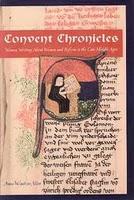Convent Chronicles: Women Writing About Women and Reform in the Late Middle Ages

The rights of women in religious communities may have been very limited in the late middle ages, but women did not tread lightly as a result of this. Convent Chronicles explores the voice and actions of religious women during this time. Research within this text supports the fact that women banded together and actively pursued their rights and beliefs. During the reform and counter reform, women fought barriers of class and privilege by branching off and forming religious communities that were more accepting than some that were already established. Some reasons for joining cloisters include avoiding arranged marriage, family tradition, and safety. Many cloisters were poor, and women were often required to have a dowry or pay yearly fees in these cases. One reason for this poverty is that the work acceptable for religious women was very limited. In some cases they were not permitted to teach because of the contact with the outside world. Convent Chronicles provides written accounts of nuns who helped their sisters in various ways when their cloisters faced hardship. Individual stories on the advantages and hardships of cloister life are also recorded. The perspective of this work is invaluable as an aid to exploring the history and writing of women during this time period.